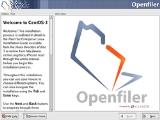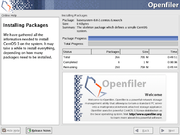
Openfiler
Encyclopedia
Openfiler is an operating system
that provides file-based network-attached storage
and block-based storage area network
. It was created by Xinit Systems, and is based on the rPath
Linux
distribution
. It is free software
licensed under the GNU General Public License
version 2. Its software stack interfaces with open source third-party software.
 The Openfiler codebase was started by Mukund Sivaraman at Xinit Systems in 2001. The company created a project and donated the codebase to it in October 2003. The first public release of Openfiler was made in May 2004.
The Openfiler codebase was started by Mukund Sivaraman at Xinit Systems in 2001. The company created a project and donated the codebase to it in October 2003. The first public release of Openfiler was made in May 2004.
disk array controller is recommended for optimal performance.
, HTTP
/WebDAV
, FTP
and iSCSI
(initiator and target). Network directories supported by Openfiler include NIS
, LDAP
(with support for SMB/CIFS encrypted passwords), Active Directory
(in native and mixed modes), Windows NT
4 domain controller
and Hesiod
. Authentication protocols include Kerberos 5. Openfiler includes support for volume-based partitioning, ext3
, JFS and XFS
as on-disk native filesystems, point-in-time snapshots with scheduling, quota-based resource allocation, and a single unified interface for share management which makes allocating shares for various network file-system protocols easy.
The following are just some of the features currently available (unless indicated otherwise) in Openfiler:
Operating system
An operating system is a set of programs that manage computer hardware resources and provide common services for application software. The operating system is the most important type of system software in a computer system...
that provides file-based network-attached storage
Network-attached storage
Network-attached storage is file-level computer data storage connected to a computer network providing data access to heterogeneous clients. NAS not only operates as a file server, but is specialized for this task either by its hardware, software, or configuration of those elements...
and block-based storage area network
Storage area network
A storage area network is a dedicated network that provides access to consolidated, block level data storage. SANs are primarily used to make storage devices, such as disk arrays, tape libraries, and optical jukeboxes, accessible to servers so that the devices appear like locally attached devices...
. It was created by Xinit Systems, and is based on the rPath
RPath
rPath, Inc. is a technology company based in Raleigh, North Carolina that provides a platform for enterprise IT organizations, independent software vendors and on-demand service providers to automate the process of constructing , deploying and updating software stacks across physical, virtual and...
Linux
Linux
Linux is a Unix-like computer operating system assembled under the model of free and open source software development and distribution. The defining component of any Linux system is the Linux kernel, an operating system kernel first released October 5, 1991 by Linus Torvalds...
distribution
Linux distribution
A Linux distribution is a member of the family of Unix-like operating systems built on top of the Linux kernel. Such distributions are operating systems including a large collection of software applications such as word processors, spreadsheets, media players, and database applications...
. It is free software
Free software
Free software, software libre or libre software is software that can be used, studied, and modified without restriction, and which can be copied and redistributed in modified or unmodified form either without restriction, or with restrictions that only ensure that further recipients can also do...
licensed under the GNU General Public License
GNU General Public License
The GNU General Public License is the most widely used free software license, originally written by Richard Stallman for the GNU Project....
version 2. Its software stack interfaces with open source third-party software.
History

Minimum
Openfiler needs at least a 500 MHz CPU, 256 MB of RAM, 10 GB hard disk space (8 GB for OS installation and 2 GB for swap space), an optical drive (for local installation) and an Ethernet like network interface.Optimal
A 64 bit processor with 1.6 GHz or more, 2 GB of RAM, 10 GB of hard disk space (8 GB for OS installation plus 2 GB for swap space) and a hardware RAIDRAID
RAID is a storage technology that combines multiple disk drive components into a logical unit...
disk array controller is recommended for optimal performance.
Features
Networking protocols supported by Openfiler include: NFS, SMB/CIFSServer Message Block
In computer networking, Server Message Block , also known as Common Internet File System operates as an application-layer network protocol mainly used to provide shared access to files, printers, serial ports, and miscellaneous communications between nodes on a network. It also provides an...
, HTTP
Hypertext Transfer Protocol
The Hypertext Transfer Protocol is a networking protocol for distributed, collaborative, hypermedia information systems. HTTP is the foundation of data communication for the World Wide Web....
/WebDAV
WebDAV
Web-based Distributed Authoring and Versioning is a set of methods based on the Hypertext Transfer Protocol that facilitates collaboration between users in editing and managing documents and files stored on World Wide Web servers...
, FTP
File Transfer Protocol
File Transfer Protocol is a standard network protocol used to transfer files from one host to another host over a TCP-based network, such as the Internet. FTP is built on a client-server architecture and utilizes separate control and data connections between the client and server...
and iSCSI
ISCSI
In computing, iSCSI , is an abbreviation of Internet Small Computer System Interface, an Internet Protocol -based storage networking standard for linking data storage facilities. By carrying SCSI commands over IP networks, iSCSI is used to facilitate data transfers over intranets and to manage...
(initiator and target). Network directories supported by Openfiler include NIS
Network Information Service
The Network Information Service, or NIS is a client–server directory service protocol for distributing system configuration data such as user and host names between computers on a computer network...
, LDAP
Lightweight Directory Access Protocol
The Lightweight Directory Access Protocol is an application protocol for accessing and maintaining distributed directory information services over an Internet Protocol network...
(with support for SMB/CIFS encrypted passwords), Active Directory
Active Directory
Active Directory is a directory service created by Microsoft for Windows domain networks. It is included in most Windows Server operating systems. Server computers on which Active Directory is running are called domain controllers....
(in native and mixed modes), Windows NT
Windows NT
Windows NT is a family of operating systems produced by Microsoft, the first version of which was released in July 1993. It was a powerful high-level-language-based, processor-independent, multiprocessing, multiuser operating system with features comparable to Unix. It was intended to complement...
4 domain controller
Domain controller
On Windows Server Systems, a domain controller is a server that responds to security authentication requests within the Windows Server domain...
and Hesiod
Hesiod (name service)
In computing, the Hesiod name service originated in Project Athena . It uses DNS functionality to provide access to databases of information that change infrequently...
. Authentication protocols include Kerberos 5. Openfiler includes support for volume-based partitioning, ext3
Ext3
The ext3 or third extended filesystem is a journaled file system that is commonly used by the Linux kernel. It is the default file system for many popular Linux distributions, including Debian...
, JFS and XFS
XFS
XFS is a high-performance journaling file system created by Silicon Graphics, Inc. It is the default file system in IRIX releases 5.3 and onwards and later ported to the Linux kernel. XFS is particularly proficient at parallel IO due to its allocation group based design...
as on-disk native filesystems, point-in-time snapshots with scheduling, quota-based resource allocation, and a single unified interface for share management which makes allocating shares for various network file-system protocols easy.
The following are just some of the features currently available (unless indicated otherwise) in Openfiler:
- Block-based virtualization
- Point-in-time snapshot support with scheduling
- Online volume size expansion (testing)
- Volume usage reporting
- Support for multiple volume groups for optimal storage allocation
- iSCSI initiator (manual currently)
- Volume migration & replication (manual currently)
- Accounts management
- Authentication using Pluggable Authentication Modules, configured from the web-interface
- NIS, LDAP, Hesiod, Active Directory (native and mixed modes), NT4 domain controller; no local user management available for shares
- Guest/public account support
- Quota / resource allocation
- Per-volume group-quota management for space and files
- Per-volume user-quota management for space and files
- Per-volume guest-quota management for space and files
- User and group templates support for quota allocation
- Share management
- Per-volume based share creation
- Multi-level share directory tree
- Multi-group based access control on a per-share basis
- Multi-host/network based access control on a per-share basis
- Per-share service activation (NFS, SMB/CIFS, HTTP/WebDAV, FTP)
- Support for auto-created SMB home directories
- Industry-standard protocol suite
- CIFS/SMB support for Microsoft Windows-based clients
- NFSv3 support for all UNIX clients with support for ACL protocol extensions
- NFSv4 support (testing)
- FTP support
- WebDAV and HTTP 1.1 support
- Linux distribution back-end for any other customizations
- Open source provides you the option to modify and deploy software as you see fit
See also
- CelerraCelerraCelerra is a discontinued NAS device produced by EMC Corporation. It was available as an integrated unit or as a NAS header which can be added to an independent EMC storage array such as a CLARiiON or a Symmetrix. It supports CIFS, NFS, FTP, NDMP, TFTP and MPFS protocols...
, a commercial proprietary NAS solution - NetApp filerNetApp filerIn computer storage, NetApp filer, known also as NetApp Fabric-Attached Storage , or NetApp's network attached storage device are NetApp's offering in the area of Storage Systems. A FAS functions in an enterprise-class Storage area network as well as a networked storage appliance...
, a commercial proprietary filer - FreeNASFreeNASFreeNAS is a free network-attached storage server, supporting: CIFS , FTP, NFS, rsync, AFP protocols, iSCSI, S.M.A.R.T., local user authentication, and software RAID , with a web-based configuration interface. FreeNAS takes less than 64 MB once installed on CompactFlash, hard drive or USB flash...
- GlusterGlusterGluster Inc. is a software company that provides an open source platform for scale-out Public and Private Cloud Storage. The company is privately funded and headquartered in Sunnyvale, California with an engineering center in Bangalore, India. Gluster is funded by Nexus Venture Partners and Index...
- NASLiteNASLiteNASLite is a commercial Linux distribution designed to turn conventional x86-based computers with PCI interface into a simple network-attached storage device. It fits onto a single 3½-inch High Density floppy disk formatted to 1.72MB. NASLite boots from the floppy disk and runs in a 4MB RAM disk...
- NexentaStorNexentaStorNexentaStor is a proprietary derivative operating system built by the developers of the open-source Nexenta OpenSolaris-distribution that has been optimized for use virtualized server environments NAS and iSCSI and Fibre Channel applications built around the ZFS file system...
- Advanced enterprise-level NAS software solution (Debian/OpenSolaris-based) - Open-E - Unified file and block storage management software.
Further reading
- Darrell Dunn (October 19, 2007) Low-Cost Storage Tools: Open-Source Projects Provide Increasing Choices, Processor (magazine), Vol.29 Issue 42, Page 12 in print issue
- Deni Connor (February 23, 2007) 10 free storage utilities. Some software is truly offered without strings, ComputerworldComputerworldComputerworld is an IT magazine that provides information for senior IT leaders. It is published in many countries around the world under the same or similar names. Its publisher is International Data Group. Computerworld serves the needs of IT management via print and online...

